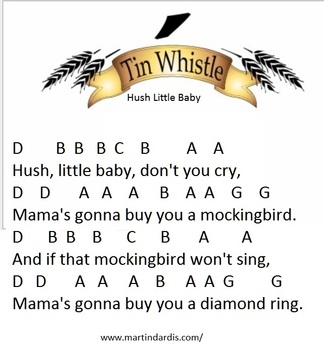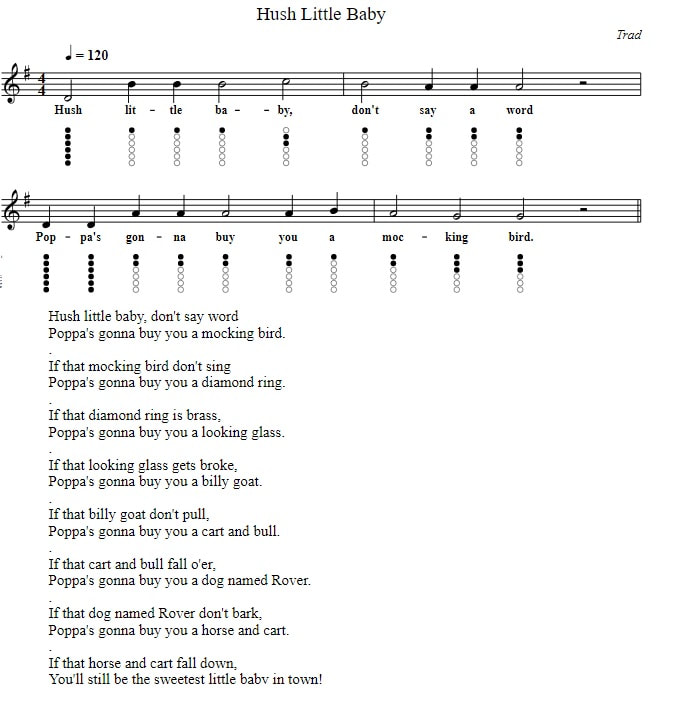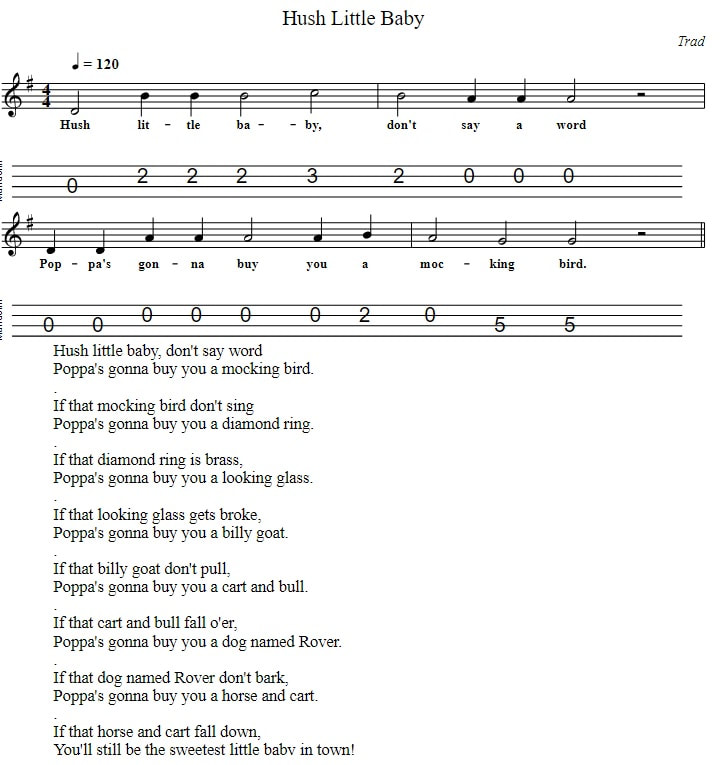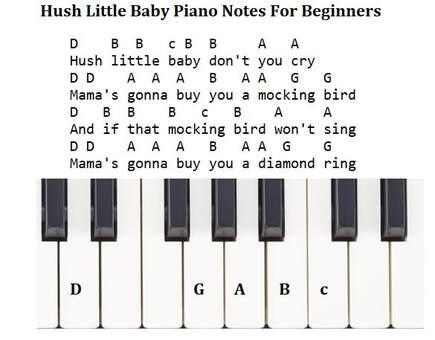Hush Little Baby Don't You Cry Tin Whistle Sheet Music Notes
The mandolin tab is now included. As usual I play this on a D whistle. It's part of the Children's tin whistle song Section to teach kids simple whistle songs using basic letter notation. The song comes from America and is traditional. Included is an easy to follow youtube video and the basic letter notes which are suitable for the recorder. Hush little baby don't you cry easy piano keyboard notes for beginners now included.
Introduction:
Lullabies have been used for centuries as a way to soothe and calm infants and young children. Most parents are familiar with the popular lullaby, 'Hush Little Baby Don't You Cry', which has been passed down through generations. The sweet melody and comforting lyrics have become a staple in many households, helping parents put their little ones to sleep. However, beyond its calming effects, this lullaby holds a deeper meaning and has a significant impact on both children and adults. In this thesis, we will explore the history, cultural significance, and therapeutic benefits of the lullaby 'Hush Little Baby Don't You Cry'.
History:
The origins of 'Hush Little Baby Don't You Cry' can be traced back to the late 19th century. It is believed to have originated in the Southern United States, specifically in the African-American community. The earliest known version of the lullaby was published in 1883 in the songbook 'Songs of the South' by Robert Winslow Gordon. It was then popularized in 1915 by the African-American singer and composer Ethel Waters, who recorded a version of the lullaby for Columbia Records.
Over the years, the lullaby has evolved and been adapted by various artists, including Burl Ives, Joan Baez, and Judy Collins. It has also been featured in movies, TV shows, and commercials, making it a widely recognized and beloved lullaby.
Cultural Significance:
The lullaby 'Hush Little Baby Don't You Cry' holds a significant cultural significance, especially in the African-American community. It is considered a part of the African-American folk tradition and has been passed down through generations as an oral tradition. The lullaby reflects the struggles and hardships faced by African-Americans, particularly during the era of slavery. The lyrics, 'Mama's gonna buy you a mockingbird, if that mockingbird don't sing, mama's gonna buy you a diamond ring', symbolize the hopes and dreams of a mother for her child, despite the challenges they may face.
Furthermore, the lullaby has also been used as a form of resistance and empowerment. During the civil rights movement, it was sung as a way to comfort and uplift children who were facing discrimination and injustice. The lullaby's message of perseverance and love has continued to resonate with the African-American community, making it a symbol of resilience and strength.
Therapeutic Benefits:
Aside from its cultural significance, the lullaby 'Hush Little Baby Don't You Cry' also has therapeutic benefits for both children and adults. Research has shown that lullabies and other forms of music can have a positive effect on infants and young children. The rhythmic and soothing melody can help calm and relax babies, making it easier for them to fall asleep. It can also promote bonding between parents and their children, as singing lullabies can create a sense of security and comfort.
For adults, the lullaby can evoke feelings of nostalgia and serve as a reminder of childhood memories. The repetitive and predictable nature of the lullaby's melody and lyrics can also have a calming effect on adults, reducing stress and anxiety. In some cases, lullabies have been used as a form of therapy for individuals with dementia or Alzheimer's, as it can help trigger memories and emotions.
Conclusion:
In conclusion, the lullaby 'Hush Little Baby Don't You Cry' is more than just a simple bedtime song. Its history, cultural significance, and therapeutic benefits make it a powerful and meaningful piece of music. Passed down through generations and adapted by various artists, this lullaby continues to bring comfort and love to children and adults alike. As long as there are babies who need to be comforted, and parents who want to soothe them, the lullaby 'Hush Little Baby Don't You Cry' will continue to be a cherished and treasured part of our cultural heritage.
Lullabies have been used for centuries as a way to soothe and calm infants and young children. Most parents are familiar with the popular lullaby, 'Hush Little Baby Don't You Cry', which has been passed down through generations. The sweet melody and comforting lyrics have become a staple in many households, helping parents put their little ones to sleep. However, beyond its calming effects, this lullaby holds a deeper meaning and has a significant impact on both children and adults. In this thesis, we will explore the history, cultural significance, and therapeutic benefits of the lullaby 'Hush Little Baby Don't You Cry'.
History:
The origins of 'Hush Little Baby Don't You Cry' can be traced back to the late 19th century. It is believed to have originated in the Southern United States, specifically in the African-American community. The earliest known version of the lullaby was published in 1883 in the songbook 'Songs of the South' by Robert Winslow Gordon. It was then popularized in 1915 by the African-American singer and composer Ethel Waters, who recorded a version of the lullaby for Columbia Records.
Over the years, the lullaby has evolved and been adapted by various artists, including Burl Ives, Joan Baez, and Judy Collins. It has also been featured in movies, TV shows, and commercials, making it a widely recognized and beloved lullaby.
Cultural Significance:
The lullaby 'Hush Little Baby Don't You Cry' holds a significant cultural significance, especially in the African-American community. It is considered a part of the African-American folk tradition and has been passed down through generations as an oral tradition. The lullaby reflects the struggles and hardships faced by African-Americans, particularly during the era of slavery. The lyrics, 'Mama's gonna buy you a mockingbird, if that mockingbird don't sing, mama's gonna buy you a diamond ring', symbolize the hopes and dreams of a mother for her child, despite the challenges they may face.
Furthermore, the lullaby has also been used as a form of resistance and empowerment. During the civil rights movement, it was sung as a way to comfort and uplift children who were facing discrimination and injustice. The lullaby's message of perseverance and love has continued to resonate with the African-American community, making it a symbol of resilience and strength.
Therapeutic Benefits:
Aside from its cultural significance, the lullaby 'Hush Little Baby Don't You Cry' also has therapeutic benefits for both children and adults. Research has shown that lullabies and other forms of music can have a positive effect on infants and young children. The rhythmic and soothing melody can help calm and relax babies, making it easier for them to fall asleep. It can also promote bonding between parents and their children, as singing lullabies can create a sense of security and comfort.
For adults, the lullaby can evoke feelings of nostalgia and serve as a reminder of childhood memories. The repetitive and predictable nature of the lullaby's melody and lyrics can also have a calming effect on adults, reducing stress and anxiety. In some cases, lullabies have been used as a form of therapy for individuals with dementia or Alzheimer's, as it can help trigger memories and emotions.
Conclusion:
In conclusion, the lullaby 'Hush Little Baby Don't You Cry' is more than just a simple bedtime song. Its history, cultural significance, and therapeutic benefits make it a powerful and meaningful piece of music. Passed down through generations and adapted by various artists, this lullaby continues to bring comfort and love to children and adults alike. As long as there are babies who need to be comforted, and parents who want to soothe them, the lullaby 'Hush Little Baby Don't You Cry' will continue to be a cherished and treasured part of our cultural heritage.
Hush little baby don't you cry piano notes for beginners
Hush little baby, don't you cry song lyrics [ 2 ]
Hush little baby, don't you cry
I'll be right here, by your side
Let the moon and stars above
Sing you a lullaby of love
Chorus:
So hush little baby, don't you cry
Close your eyes and drift away
In my arms, you'll be safe and sound
Hush little baby, don't you cry
Verse 2:
I know the world can be so tough
But I'll protect you, that's enough
With every breath, I'll hold you tight
And chase away all your fears at night
Chorus:
So hush little baby, don't you cry
Close your eyes and drift away
In my arms, you'll be safe and sound
Hush little baby, don't you cry
Bridge:
I'll be there to wipe your tears
And calm your heart when it's filled with fears
Just remember, you're not alone
My love for you will always be shown
Chorus:
So hush little baby, don't you cry
Close your eyes and drift away
In my arms, you'll be safe and sound
Hush little baby, don't you cry
Outro:
So hush little baby, don't you cry
I'll be here until morning light
And when you wake, I'll be by your side
Hush little baby, don't you cry.
Hush little baby, don't you cry
I'll be right here, by your side
Let the moon and stars above
Sing you a lullaby of love
Chorus:
So hush little baby, don't you cry
Close your eyes and drift away
In my arms, you'll be safe and sound
Hush little baby, don't you cry
Verse 2:
I know the world can be so tough
But I'll protect you, that's enough
With every breath, I'll hold you tight
And chase away all your fears at night
Chorus:
So hush little baby, don't you cry
Close your eyes and drift away
In my arms, you'll be safe and sound
Hush little baby, don't you cry
Bridge:
I'll be there to wipe your tears
And calm your heart when it's filled with fears
Just remember, you're not alone
My love for you will always be shown
Chorus:
So hush little baby, don't you cry
Close your eyes and drift away
In my arms, you'll be safe and sound
Hush little baby, don't you cry
Outro:
So hush little baby, don't you cry
I'll be here until morning light
And when you wake, I'll be by your side
Hush little baby, don't you cry.





